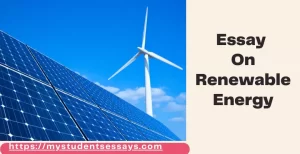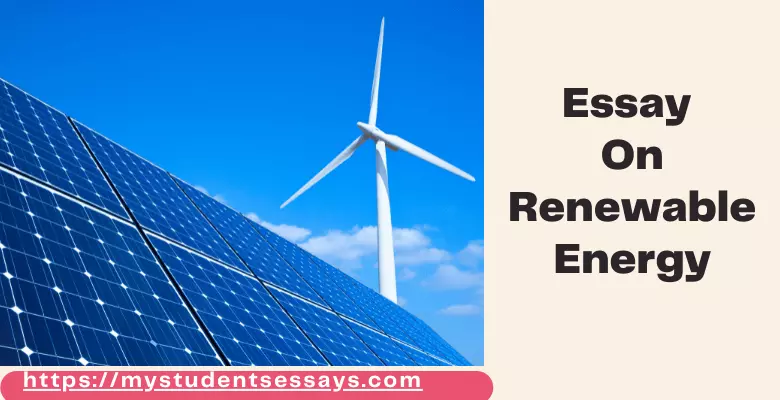The term renewable energy refers to the various sources of energy that are capable of replacing themselves naturally. These sources can be replenished quickly, and they are generally not depleted by use. The production of electricity from solar, wind or wave power is known as renewable energy. Renewable energy is considered to be a sustainable source because there is no permanent damage done to the environment through its use. It does not produce waste material or cause air pollution, water pollution or resource depletion.
Essay on Renewable Energy | Types, Examples, Benefits & Challenges
The term ‘renewable energy’ refers to sources of energy that are not depleted as they are are used, and that can be naturally replenished. It therefore only refers to the types of energy that will reoccur indefinitely because their supply is constantly renewed by natural phenomena.

Renewable energy has a wide range of applications in modern times and is constantly increasing its presence in today’s world. Wind power, solar power, biodiesel fuels manufactured from vegetable oils and ethanol are all examples of renewable energy sources.
>>>> Related Post: Essay on Natural Resources For Students
They include: sun, wind, rain, tides and waves. These types of energy can be used to generate electricity or produce heat. The use of the term ‘renewable’ excludes burning fossil fuels such as coal, oil and natural gas because while these are naturally replenished over a very long timescale they produce carbon dioxide when used.
List of Renewable Energy Resources:
1. Biomass:
Biomass is organic material from living or recently-living organisms. It can be used to produce heat or electricity. Some examples of biomass energy sources are: biodiesel, biogas and biofuel.
2. Solar Energy:
Solar power is the conversion of sunlight into electricity by using solar cells.
3. Wind Energy:
Wind energy converts wind energy into a more useful form of energy such as mechanical power or electrical power.
4. Hydroelectricity:
Hydroelectric power is the generation of electricity by using the gravitational force of falling or flowing water to drive turbines that produce electric power.
5. Geothermal Energy:
It is heat energy from within the Earth’s crust that can be used to generate electricity.
6. Tidal Power:
Tidal power converts the energy of tides into electricity or other useful forms of power such as mechanical or thermal energy.
7. Ocean Thermal Energy Conversion (OTEC):
Ocean thermal energy conversion (OTEC) is a form of renewable energy and utilizes the temperature difference between cooler deep and warmer shallow or surface seawaters to run a heat engine and produce usable electricity.
8. Solar Thermal Energy:
It is used by solar thermal collector panels that collect heat from the sun in order to heat water for domestic, commercial, or industrial use.
9. Hydrogen Energy:
Hydrogen can serve as an energy carrier, whose properties are very similar to natural gas.
10. Geothermal Heat Pumps:
These devices use the natural thermal energy of the ground or groundwater-fed water systems for heating and cooling buildings and other structures.
11. Biogas:
It is a renewable energy source which is produced by the breakdown of organic matter in the absence of oxygen.
12. Fuel Cells:
They are electrochemical devices that convert chemical fuel directly into electrical power via an electrochemical reaction with oxygen or another oxidizing agent.
Major Benefits of Renewable Energy:
Renewable energy has many advantages. Some of them are as follows:
1. Renewable energy is clean and sustainable. It reduces the emission of greenhouse gases which cause global warming. Using renewable energy can help reduce air pollution, acid rain, smog and tap water contamination.
2. Since most types of renewable energy rely on the sun, they do not emit harmful by-products such as carbon dioxide and other greenhouse gases.
3. Renewable energy can reduce our dependence on foreign oil and save us money.
4. Using renewable energy means less environmental degradation which preserves biodiversity and reduces pollution of land, water and air which can help slow climate change.
5. Since we all share the same planet and we depend on each other, it is important to preserve our environment for future generations.
Challenges of Renewable Energy:
Renewable energy has some disadvantages as well. Some of them are as follows:
1. The sun is not available at night so solar power is not available all the time. In cloudy conditions there may not be enough solar power for a plant to use.
2. It is difficult to store energy produced from renewable sources such as geothermal and wind, so more research needs to be done on energy storage before this energy can become a practical source of power.
3. The technology required to harness the sun, wind and other renewable energy sources is not available for all areas of the world because some areas do not receive enough sunlight to make solar power a viable option.
4. Because renewable energy plants are mostly stationary they may compete with agricultural land which can lead to food insecurity as farmers could lose their land. Since these plants use up large areas of land, this could lead to deforestation and biodiversity loss.
5. As with all new technologies, renewable energy sources are more expensive than traditional fossil fuel power plants. It is therefore important that these costs decrease as the technology becomes more common place.
>>>> Related Post: Essay on Fire, Uses & Importance
Conclusion
In conclusion, there are many types of renewable energy resources with different benefits and challenges. They might be a clean and sustainable alternative to fossil fuels but they have some limitations as well. One main concern is that the technology required to harness most of these resources is not available in all parts of the world. Although we need more research on storage techniques for renewable energy, more and more countries are turning to green sources of energy and renewable technologies. It is important that we continue this trend and increase the use of renewable energy as it will benefit future generations as well as current ones.
